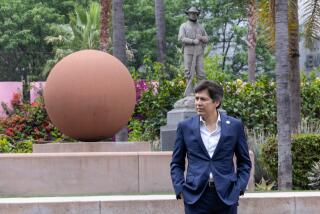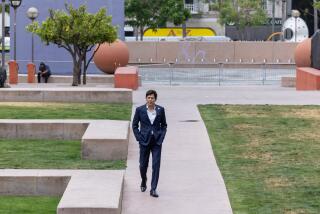Early Black Heroine of L.A. Finally Receives Her Due
- Share via
Biddy Mason was a living legend in Los Angeles back in the mid-1800s. The former slave--who had walked hundreds of miles to reach California and freedom--helped found First African Methodist Episcopal Church, the first black church in Los Angeles, and the first elementary school for black children.
But for all she did in life, Mason has been all but forgotten since she died in 1891. For almost 100 years, she has been buried in an unmarked grave in Evergreen Cemetery in Boyle Heights. That oversight was corrected Sunday when Mayor Tom Bradley and about 3,000 members of the church paid homage to her, and a tombstone, hailing Mason as a philanthropist and humanitarian, was unveiled.
The tribute was the first of many planned for the next year. “She is an example of the courage of black women in the early days of this city,” Bradley said at Palm Sunday services. “Our young people need to know about her.”
Later, under the shade of a magnolia tree in the cemetery, church members softly sang “Amazing Grace” and other hymns and talked of Mason’s many contributions.
Mason’s life was the subject of a national poster on black heroines in February and has recently been added to several history textbooks.
“When I was going through school, we never talked about Biddy,” said Linda Cox, a Mason descendant. But Cox’s daughter, Cheryl, 9, recently came home from the fourth grade very excited. “She said, ‘Mommy, part of our family is in the history books,’ ” Cox said.
Mason was born a slave in Mississippi in 1818. She and her three daughters eventually became the property of a Mormon family that migrated to Utah. From there, Mason and her family came to California, where she won her freedom in the courts in 1856.
Because many parents gave Mason, a midwife, land in payment for delivering their children, she became a wealthy landowner. Sixteen years after she was freed, a small group of blacks met in Mason’s living room at the corner of Spring and 4th streets to form the first black church in Los Angeles. Mason later founded an elementary school.
The National Endowment for Humanities is supporting two public art projects dedicated to Mason that will be placed inside a 10-story retail and garage complex which is being built on the site of her former home.
More to Read
Sign up for Essential California
The most important California stories and recommendations in your inbox every morning.
You may occasionally receive promotional content from the Los Angeles Times.










